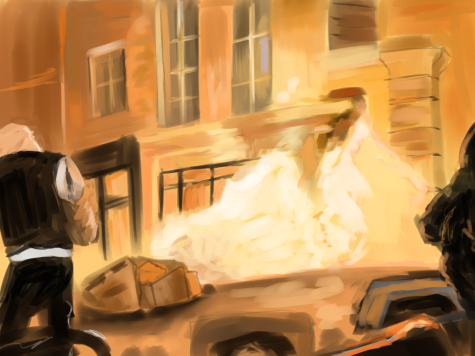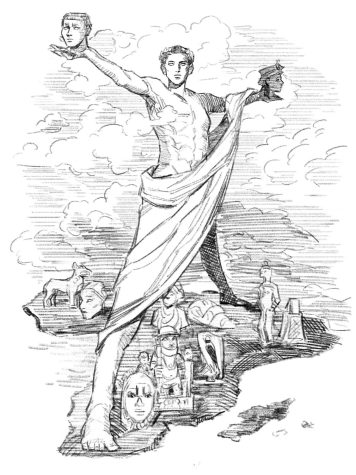Myanmar’s Military Coup: The End of Aung San Suu Kyi’s Rocky Rule
March 30, 2021
On February 1st, a beacon of hope for Burmese citizens was shattered after a military coup ripped through the country after a recent election. As Hannah Beech of the New York Times puts it, on Sunday night, “we all went to sleep. And then suddenly, our phones start ringing. And the news is bad.” [1]
Daw Aung San Suu Kyi, the world-renowned Nobel Peace Prize laureate, supposed human rights activist, and 75-year old civilian government leader has—once again—been detained by the military. As internet shortages and widespread censorship went into effect, the news hit hard for people across Myanmar, sparking deadly protests in dissent to the coup.
From the beginning of her political career, Ms. Suu Kyi was known as a democratic savior. Being the daughter of the General who freed Myanmar from British colonial rule, she gained popularity through listening to the Burmese’s call for democratic reform. In 1990, her establishment of the National League of Democracy put her at the forefront of rebellion against political corruption. However, the military resented her immense popularity and the Junta did not want to give up power, so she was put under house arrest for many years in order to stifle possible unrest.
Even in detention, the resilient leader was able to maintain her status as the symbol for the country’s democratic future. November 14th, 2014 marked the prime of Daw Aung San Suu Kyi’s political life; Former President Barack Obama’s visit to her home commemorated her role in creating Myanmar’s growing stance as a democratic country.
During his visit to her house in the Southeast Asian country, formally known as Burma, Obama proclaimed, “As we know, it was in this house that she endured years of confinement — never giving up hope, never wavering in her determination to build a free and democratic Burma.” [2]
The years she spent in confinement still did not suppress her popularity among the public. After finally being freed from House arrest, Ms. Suu Kyi was elected in 2015 again. Since her children are foreign nationals, the constitution technically does not allow her to be the president so she effectively became known as the de facto democratic state counselor.
During her term was when Aung San Suu Kyi made the gravest mistakes of her career: she failed to cooperate and work with the military, who have large, unspoken power. And then, despite her initial phenomenal public image, Kyi’s reputation as the “human rights activist” was severely tarnished on the global stage when she defended the military’s odious ethnic cleansing of the Rohingya, a Muslim ethnic minority group. Despite this mark on her reputation worldwide, she remained the people of Myanmar’s goddess; she had been the one to listen to the people’s cries and pull the country up from its adversities. Hence, it’s no surprise that she emerged victorious in a landslide victory in the 2020 election.
According to the People’s Alliance for Credible Elections, 79% of Burmese people had trust in her in 2020. And this unconditional loyalty that the people had towards Kyi was what the military failed to consider during their coup. [3]
February 1st was the day parliament was supposed to meet, but it turned out to be the day that the military, claiming election fraud, conducted a coup led by General and commander-in-chief Min Aung Hlaing. Several important pro-democracy politicians and ministers, including Ms. Suu Kyi were arrested. Attempting to silence the public, the military cut off Facebook Messenger, landlines, and TV channels. A curfew was set in place, and soldiers blocked off busy roads. These drastic measures were bound to have cascading impacts.
Protests across Myanmar have become at the spotlight of media outlets worldwide. Social media erupted in solidarity with the people of Myanmar after a woman filming an aerobics routine in the foreground of the military coup went viral on Twitter and Instagram last week. In Myanmar, texts and available social media platforms have enabled people to mobilize protests. In fact, hundreds of thousands of people have taken to the streets for the past two weeks demanding political change. Monday, February 22nd has had the largest turnout because of widespread anger after police fired at protesters last Saturday, killing two and injuring many. [4]
The imprisonment and downfall of Aung San Suu Kyi occurred through an unjust abuse of military power, yet the causes of this event stretch back to years of unrest. Kyi’s inability as leader to earn the favor of the military ultimately led to her fall. While the future of Myanmar’s government has yet to be decided, the response to this month’s military coup is a testament to the value of democracy. No matter how flawed, countries and world leaders across the world need to show increased support to Myanmar’s short-lived but progressive democracy.
Sources:
[3] https://www.bbc.com/news/world-asia-pacific-11685977


